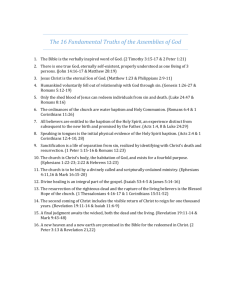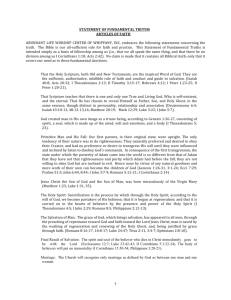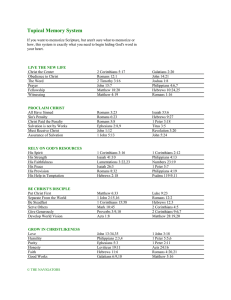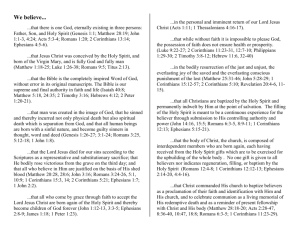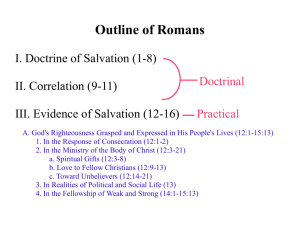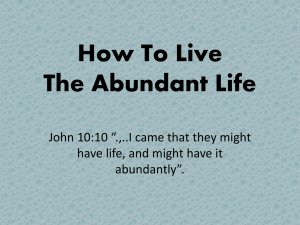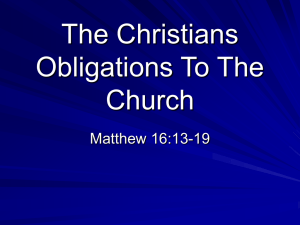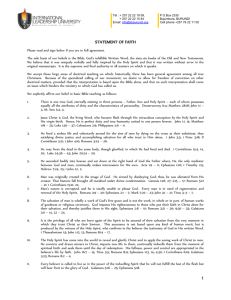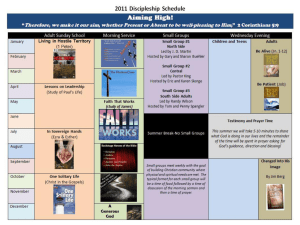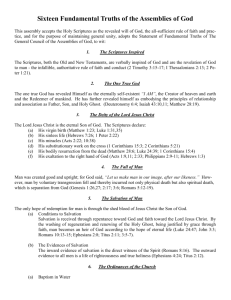the Statement of Faith Long Form
advertisement
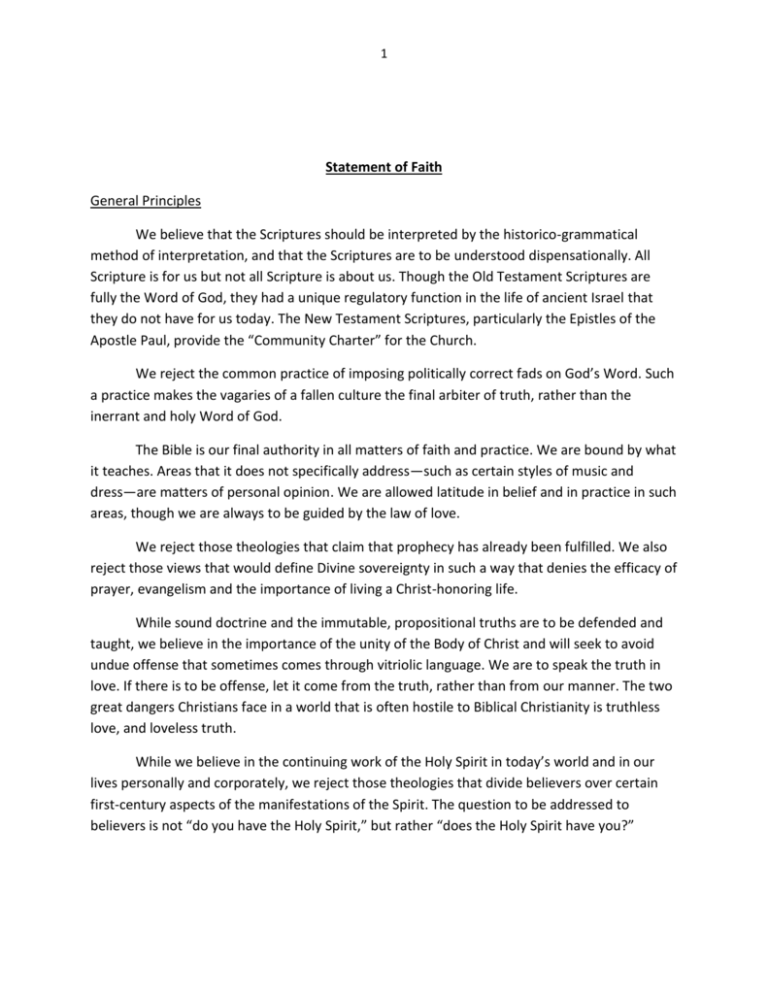
1 Statement of Faith General Principles We believe that the Scriptures should be interpreted by the historico-grammatical method of interpretation, and that the Scriptures are to be understood dispensationally. All Scripture is for us but not all Scripture is about us. Though the Old Testament Scriptures are fully the Word of God, they had a unique regulatory function in the life of ancient Israel that they do not have for us today. The New Testament Scriptures, particularly the Epistles of the Apostle Paul, provide the “Community Charter” for the Church. We reject the common practice of imposing politically correct fads on God’s Word. Such a practice makes the vagaries of a fallen culture the final arbiter of truth, rather than the inerrant and holy Word of God. The Bible is our final authority in all matters of faith and practice. We are bound by what it teaches. Areas that it does not specifically address—such as certain styles of music and dress—are matters of personal opinion. We are allowed latitude in belief and in practice in such areas, though we are always to be guided by the law of love. We reject those theologies that claim that prophecy has already been fulfilled. We also reject those views that would define Divine sovereignty in such a way that denies the efficacy of prayer, evangelism and the importance of living a Christ-honoring life. While sound doctrine and the immutable, propositional truths are to be defended and taught, we believe in the importance of the unity of the Body of Christ and will seek to avoid undue offense that sometimes comes through vitriolic language. We are to speak the truth in love. If there is to be offense, let it come from the truth, rather than from our manner. The two great dangers Christians face in a world that is often hostile to Biblical Christianity is truthless love, and loveless truth. While we believe in the continuing work of the Holy Spirit in today’s world and in our lives personally and corporately, we reject those theologies that divide believers over certain first-century aspects of the manifestations of the Spirit. The question to be addressed to believers is not “do you have the Holy Spirit,” but rather “does the Holy Spirit have you?” 2 These doctrinal affirmations are deliberately couched in first-person language. It is our belief that Biblical theology is intensely personal and ought to be reflected in personal integrity, character and hope. We Affirm The Following And Believe That Each Truth Is To Be Our Individual Hope I. II. III. IV. V. VI. VII. VIII. IX. I trust the Bible as the Word of God, and I therefore treasure its truths and respect its reproofs. Psalm 119:9, 11, 105; Matthew 5:18; 2 Timothy 3:16-17; 1 Peter 1:2425. I believe that the Bible presents a consistent, credible, and defensible world view, and that the truths which undergird this worldview are to be articulated and defended. 1 Peter 3:15; Acts 17:22-31; 2 Corinthians 5:11 I acknowledge the Triune Creator God as my Heavenly Father who is intimately acquainted with all my ways, and who shows His paternal care through Fatherly chastisement as well as His abundant blessings. Psalm 103:13-4; Matthew 6:9; Romans 8:15; Hebrews 12:5-11 I claim Jesus Christ as my Lord and Savior and acknowledge that He is very God who came in human flesh through a virginal conception. Isaiah 7:14; John 1:1; 1 Corinthians 2:8; Isaiah. 9:6-7; Hebrews 1:8-12 I acknowledge that the Holy Spirit is a living and vital Person. He is at work in the world, and especially in His yielded servants, to energize, comfort and lead, and to convict the world of sin. Genesis 1:2; Rev. 22:17; John 16:7-11; Acts 5:3-4; 1 Corinthians 12:11 I confess that Adam was a real, historical, time-space figure, and that Adam’s fall into sin brought untold grief and suffering on the entire cosmos. Genesis 3:1619; Romans 5:12-19; Romans 8:21-22; 1 Cor. 15:22 I believe that Jesus Christ made an atonement of sufficient efficacy for all people on the planet earth, and that the effects of His atonement become efficient for those who believe in Him apart from meritorious works. John 3:16; Romans 4:5; 2 Timothy 1:9; Titus 3:5 Though I see the effects of sin, death and decay all around me, I fully believe that the physical, bodily resurrection of Jesus Christ is the model and paradigm for my physical, bodily resurrection. John 20:19-29; Acts 2:29-32; 1 Corinthians 15:1220 I believe that the well-being of the home is essential to an individual’s growth, maturity and success, as well as to national stability, and will work to support the Bible’s teaching on marriage, child-rearing and education. Genesis 2:24-25; Matthew 19:1-12; Ephesians 5:22-6:4; 1 Peter 3:1-7 3 X. I understand the Scriptures to teach the reality of a personal devil and his evil host, and in the reality of spiritual warfare. Isaiah 14:12-15; Ezekiel 28:12-19; 2 Corinthians 10:3-6; Ephesians 6:10-17 XI. I believe that evangelism is to be the passion of every Christian, and that an important aspect of this passion is sharing Christ with people all over the world. Genesis 12:3b; Isaiah 45:21-22; Matthew 28:18-20; Acts 1:8; Acts 10:23-48; Romans 15:22-24 XII. I believe in the Christian’s mandate to bring Christian teaching and principles to every area of life, every profession, and every endeavor, including issues in the political arena, such as the sanctity of human life, and that God’s Word takes precedence over the mandates of earthly kings and rulers. Daniel 3:13-18; Matthew 5:13-16; Acts 5:29 XIII. I live in the expectation of my Lord’s imminent return to rapture me and all Church Age saints from the earth prior to a period of intense world-wide suffering known as The Great Tribulation. 1 Corinthians 15:51-52; 1 Thessalonians 4:13-18 XIV. I recognize God’s unconditional covenant with Israel and believe that God will fulfill all His promises to Israel during a literal, earthly Millennium. Genesis 15:1821; Jeremiah 31:32-37; Ezekiel 36:22-35; Ezekiel 37:1-14; Romans 11:25-26 XV. I understand that all who have died will one day be brought back to life—believers in Christ to everlasting communion with God in a real place known as Heaven, and unbelievers to everlasting separation from God where they will spend eternity in a real place known as Hell. John 5:28-29; John 14:1-3; Matthew 25:31-46; Revelation 20:11-15; Revelation 21:8 XVI. I am grateful to be a part of a local body of believers which exists to proclaim God’s truth, to administer the ordinances of baptism and the Lord’s Supper, to stimulate growth toward maturity, and to bring glory to God. 1 Timothy 3:15; Titus 1:5; Acts 13:1-3 XVII. I rejoice that God is raising spiritual leaders in each local body of believers and that He has given the requirements for servant-leadership in each congregation. Titus 1:5; 1 Timothy 3:1-13; 1 Thessalonians 5:12-13; Hebrews 13:17 XVIII. I affirm that worship is my privilege and responsibility and that my worship ought to be intelligent as well as heart-felt, so that both biblical exegesis and teaching, and the ineffable work of the Holy Spirit, make for a comprehensive worship experience pleasing to God. John 4:23; Ephesians 5:18-21; Timothy 3:15
